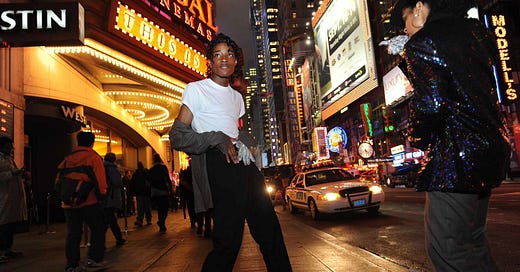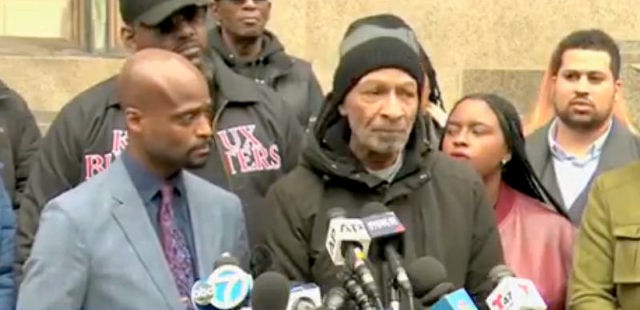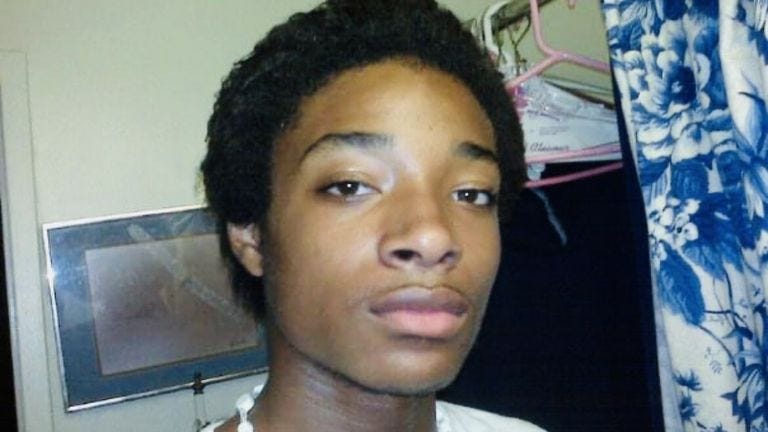Jordan Neely
.
"No one deserves to be choked,"
Gwen Carr, the mother of Eric Garner whose son was
killed by a New York Police Department officer who
had placed him under chokehold 10 years ago.
.
On Monday, December 9th, the ex-marine Daniel Penny who had been charged with second degree manslaughter and criminal negligent homicide was acquitted on the latter remaining charge. He was allowed to walk free. The verdict aroused very intense emotions: jubilation and relief among the supporters of Daniel Penny. Anger, sadness, and a sense of “here we go again” from Neely's supporters.
The mother of Eric Garner, whose son had been choked to death by a police office summed up Neely's death succinctly as history repeating itself. She stated with indignation "No one deserves to be choked, you know, we're in that courtroom, and people are cheering for the verdict."
The father of Jordan Neely blasted, "My son didn't have to go through this. I didn't have to. I’ve had enough of this. The system is rigged." The father has already taken out a civil lawsuit against Daniel Penny.
Andre Zachary, Jordan Neely’s father
.
So the controversy over Jordan Neely continues. Unfortunately, judging by the number of victims over the past 10 years by chokehold, tragic cases are likely to loom up again and again. The perspectives for any black, homeless or mentally ill persons who find themselves in the wrong place at the wrong time on the streets look very grim. It is the most vulnerable sections of the community who are more likely to be the victims of crime. Yes, riders on the subway can be victims but what about an African American killed while going jogging, or a person simply being restrained by a police officer who ignores his plea that he can't breathe—and a homeless person being murdered on a subway train?
For anyone unaware, a 30-year-old homeless and Michael Jackson Impersonator Jordan Neely boarded a New York Subway train on the 1st May 2023. Neely was homeless, hungry, and depressed. He suffered from schizophrenia and depression and also took some drugs. He started to behave erratically and scream loudly that he was thirsty, hungry, and wanted to go to jail—and that he would kill somebody to do this. Although he did not approach or assault any passenger his behaviour frightened some passengers.
An ex-marine, the then-25-year-old Daniel Penny approached Neely from behind, grabbed him, and pulled him down holding him in chokehold for six minutes. About three other passengers helped Penny to pin him down. Despite some requests by a few other passengers to let him Neely go, Penny maintained his grip. The result was Jordan Neely later died in hospital.
Penny later claimed he had intervened to protect other passengers because he thought Neely was 'a crackhead' who was acting like a lunatic. He thought that it was such people like Neely were capable of throwing people off platforms to face coming trains. {Penny had read before of 20 such incidents in the New York subway alone in 2023 before May 1st}.
The result was that Penny was charged with second degree manslaughter and criminally negligent homicide. The case deeply has further divided an increasingly polarised America along lines of race, homelessness, mental illness, and issues of safety. Nevertheless it is an oversimplistic and misleading generalisation to claim all Democrats condemn Penny while Republicans support him.
StreetSense have come across Republicans who condemn Penny and Democrats who do not. We should not exaggerate this polarisation. Though one may be forgiven for forgetting the American Civil War did not end in 1865 !
The last days of this trial were odd by any legal standards. Some say a legal precedent was established due to outside pressure. Who would have thought that the prosecution would have made a request to drop the charge of second degree manslaughter and let the jury deliberate on the less serious charge of criminally negligent homicide?
The jury were deadlocked on reaching a decision of the first charge twice. Is a hung jury a reasonable pretext for dropping this charge? Shouldn't the jury have been granted more time to deliberate over this case? Why the hurry? Does making a decision as quickly as possible produce a better result? Why the impatience? If this deadlock would have led to a retrial then so be it. I think the pressure to close this case quickly was because it represented a pandora's box where uncomfortable issues such as homelessness, racial discrimination, and mental distress horrendously flew out. The legal authorities sought to put the lid back on the box.
The case also shows New York at its worse.
One of the most ludicrious claims made was that charging Daniel Penny with second degree manslaughter represented a miscarriage of justice. The idea was that the former charge was not sincere and merely a ploy by the prosecution to strongarm the jury into finding Penny guilty on the second less serious charge. The implication is that there was no pretext for pressing this charge. But if you listen to the summoning up of the prosecutor Dafna Yoran you'll find her attempting to back up those serious charges. The charge of second degree manslaughter was not made lightly or simply as a ploy.
What might be confusing for the jury is why they have to deliberate on two different charges rather than one? How can you be accused of two very different charges that seem incompatible? Perhaps there was no real need for a second charge of criminally negligent homicide! Concerning the latter charge there is no awareness but ignorance of the consequences of your actions.
Was the charge of second degree manslaughter a miscarriage of justice? Was it inappropriate to use it in the first place in this case? Not at all! Second degree manslaughter is a situation where the offender had no intention or plan to kill the victim. Instead the attacker used force 'recklessly' in the sense of not being careful about the results of his action. What distinguishes this from the lesser charge of criminally negligent homicide is that the prosecution claimed that Penny would have been aware of how dangerous his actions could be and was indifferent to the safety of his victim. His training in the marines along with a course in the marital arts gave him awareness. In other words, he should have known better.
The prosecutor Dafna Yoran stressed how Penny had held on to him for too long and even refused to let go despite pleas from at least 3 other passengers. Penny just ignored them. Penny claimed that if he had let go Neely might have got up again and then attacked. Whatever the case, Penny appeared heedless of the danger or the consequences of chokehold. There was no reflection on his actions. May be marine training can make a soldier less reflective or questioning of their actions as well as the behaviour of others. Under police interrogation Penny indicated a lack of understanding of mental health problems.
It was this alleged awareness of the dangers in chokehold which the prosecution claimed Penny must have had that was the crux of the issue.
The prosecution proved beyond doubt that Jordan Neely did not assault anyone, that Neely died from chokehold and not sickle cell condition, schizophrenia or the presence of drugs and that Penny acted recklessly by holding on to Neely for too long and going too far. But the jury could well have been confused by how the defense presented Neely as some lunatic bent on attacking someone and also claiming his death was caused by multiple factors. The impact of rhetoric can cancel out the use of right reason.
Given the number of high-profile cases of African Americans being choked to death by police officers, then you'd think that Penny and many others would by this time have been aware of the high risk of holding someone in chokehold. Even the Department of Justice forbids officers from using chokehold to restrain people because it is so dangerous. The publicity around this issue has been highlighted for almost a decade.
Just consult the Black Lives Matter movement and you'll be shocked at not only the methods but the on-going wall of indifference from law enforcement bodies on this question. In 2020, the New York Times undertook an investigation where they found that over 70 people had died in police custody due to chokehold. In July 2014, you had the death on Eric Garner who was killed by a police officer Daniel Panjalep in New York. Eric Garner shouted to the police officer "I can't breathe" 11 times! The policeman still did not let him go. He died. His mother was in court to hear another victim Jordan Neely and must have been shocked at the callous indifference to the on-going victims. The number of victims of chokehold never seems to end: Javier Ambler, Manuel Ellis and George Floyd. Who is going to be next? If those cases won't move people what will?
I'm aware of two cases in Scotland where two people suffering from mental health cases made threats and actually assaulted people. But they were not choked to death and the Scottish legal authorities suggested other ways of constructively responding. Those cases are confidential so I can't divulge the names of those people but I can honestly state they acted far more dangerously than Jordan Neely.
Neely was charged with assault 44 times but never killed anyone on those occasions. Why would it have been different on May1st 2023? Understanding mental health problems can be daunting. Even trained psychiatrists and nurses can be confounded. But they try to understand those problems. And overwhelming research indicates that most people who suffer from schizophrenia are harmless and not dangerous to other people. What they say can't always be taken too literary. Contrary to what some people believe, being mentally ill is not a crime. People don't choose this illness. It is an illness where the person suffers dreadfully from hallucinations, delusions and loss of personal freedom they'd rather not have.
Perhaps the only person who can understand how dreadful schizophrenia is, would be another person who suffers from the same illness. Schizophrenics correctly state, “Practically nobody understands us.” Ex-soldiers suffering from Post Traumatic Stress Disorder also complain, “Hardly anyone understands our plight.”
On one level the bizarre behaviour of Jordan Neely seems just erratic. But if you hear his words "I am thirsty, hungry, and want to get arrested and will kill…” there is a logic there. It seems like a desperate plea for help rather than a preparation for an attack. Neely wanted to 'arrest his way out of homelessness.' This is not a new phenomena. Some homeless people have been doing this for over hundred years and the police are aware of this problem. In prison, at least they feed you and you have a roof over your head!
Jordan Neely had a hard life. He had it much harder than most of us. At 14, his mother had been murdered by her boyfriend, and Neely was later hospitalized for depression. He was clearly traumatized by all this. He was later diagnosed with schizophrenia where he became increasingly paranoid. What is very sad is that Neely's paranoia was in some sense justified. Some people were against him simply for being homeless and the colour of his skin. Being rendered homeless further dented his low self esteem. He told a doctor in 2017 that being homeless, living in poverty and having 'to dig through garbage' for food made him feel so worthless and hopeless that he thought of killing himself. The hospital records show all this. With all those troubles, the fact that Neely managed to become a successful Michael Jackson impersonator is short of a miracle. This man must have had incredible talent!
The tragedy of his death was avoidable. Some future tragedies can be avoided if people at least stop and carefully reflect.
The jury in this case asked the judge "What does it mean to act reasonably?" This is a question that needs repeating!





